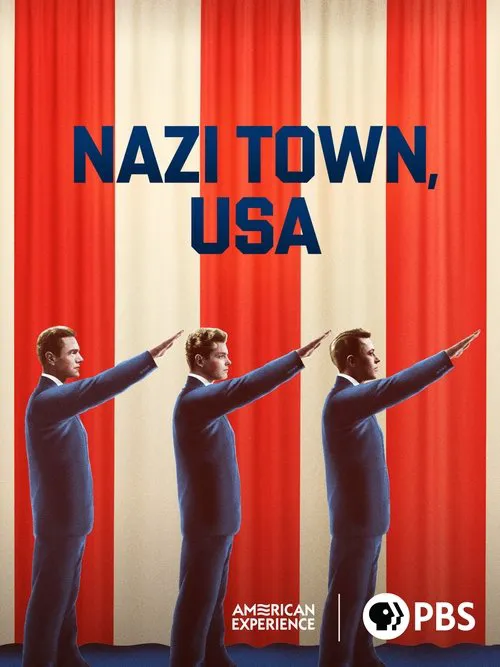Nazi Town, USA

あらすじ
Nazi Town, USA, a gripping documentary that sheds light on a dark chapter in American history, reveals the disturbing tale of the German American Bund, a Nazi organization that infiltrated the United States in the 1930s. The film begins by taking the audience back in time to February 1939, when the German American Bund organized a "Pro-American Rally" at Madison Square Garden in New York City. The event drew a massive crowd of over 20,000 Americans, who were treated to a disturbing spectacle of patriotism and Nazism. Images of George Washington, the iconic figure of American independence, hung alongside swastikas, a potent symbol of the Bund's twisted ideology. Fritz Kuhn, the charismatic leader of the German American Bund, took the stage as the keynote speaker. With conviction and charm, he delivered a speech that was equal parts demagoguery and hate-mongering. Kuhn's words dripped with anti-Semitism, as he attacked the "Jewish-controlled media" and called for a return to a "racially pure" America. His message was shrouded in the rhetoric of patriotism, but its underlying tenor was clear: the Bund represented a threat to the very fabric of American democracy. As the film unfolds, it becomes clear that the German American Bund was more than just a fleeting phenomenon. The organization had chapters in suburbs and big cities across the country, with a presence that belied its seemingly innocuous name. The Bund's members were a diverse group of Americans, many of whom were well-educated and middle-class. They saw themselves as patriots, but their actions were anything but American. The Bund's activities were marked by a sinister blend of Nazi ideology and patriotic fervor. The organization held joint rallies with the Ku Klux Klan, a fellow extremist group that shared its views on racial purity. These events were often accompanied by marches, chants, and torchlight processions, which sent a chilling message to African Americans and Jews across the country. The Bund saw itself as a vanguard of white supremacy, determined to create a racial hierarchy in America that would exclude non-Aryans. One of the most disturbing aspects of the German American Bund's activities was its operation of summer camps for children. These camps were designed to indoctrinate young minds with Nazi ideology and imagery, often with a patriotic veneer. The Bund's leaders genuinely believed that their brand of fascist ideology was a perfect reflection of American values. In reality, their ideology was a toxic mix of racism, anti-Semitism, and xenophobia. The Bund's ideology was rooted in the concept of Aryanism, which posited that white, blonde-haired, blue-eyed individuals were the superior branch of the human family. Any deviation from this ideal was seen as a threat to the Aryan "bloodline" and was therefore to be eliminated. This pseudo-scientific nonsense was a cornerstone of Nazi ideology, which would soon wreak havoc on Europe. In America, the Bund's ideology was no less pernicious, as it legitimized hatred and intolerance towards minorities. As the film progresses, it becomes clear that the German American Bund was a symptom of a wider malaise that afflicts American society. The Bund's rise to prominence spoke to a deep-seated fear of change and a nostalgia for a mythical America that never existed. Many Americans, caught in the midst of the Great Depression, lashed out at perceived enemies, real or imagined. The Bund's demagoguery tapped into this wellspring of fear and anger, offering a simplistic solution to complex problems. The film also raises thorny questions about the nature of patriotism. How could Americans, supposedly devoted to democratic values and the principles of freedom, allow the Bund to infiltrate their communities? Why did so many Americans fail to recognize the Bund's Nazi ideology for what it was – a poison that threatened the very foundations of American democracy? The answers to these questions are complex and multifaceted. The Bund's success was partly due to its ability to blend in and exploit American prejudices. By presenting itself as a patriotic organization, the Bund was able to tap into the widespread anti-Semitism that was endemic in America during the 1930s. The Bund's ideology was also shrouded in a rhetoric of nostalgia, which allowed it to tap into a deep-seated desire among some Americans for a return to a supposedly purer, more harmonious America. Ultimately, Nazi Town, USA is a sobering reminder that the dark impulses of fascist ideology are not unique to Europe. The film serves as a cautionary tale about the dangers of xenophobia, anti-Semitism, and racism, all of which are still potent forces in American society today. As we grapple with the pressing issues of our time, from immigration to free speech, the lessons of the German American Bund offer a stark warning about the dangers of intolerance and the importance of defending democracy.
レビュー
おすすめ




